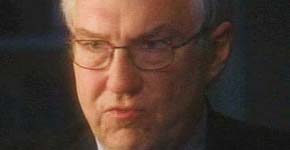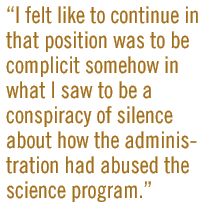
Piltz is the director of the Climate Science Watch at the Government Accountability Project. He is former senior associate with the U.S. government Climate Change Science Program (CCSP), which coordinates the climate change research of 13 different federal agencies. Previous to that (1991-1994), he was a Congressional staffer for the House Committee on Science, Space, and Technology. In March 2005, Piltz resigned from his position with the Climate Change Science Program over tampering with scientific reports by representatives of the Bush administration. Here, Piltz discusses the events that led him to resign and the influence of the fossil fuels industry over the Bush administration's environmental policy. This is an edited transcript of an interview conducted Nov. 13, 2006.
... Let's start with your role in the Climate Change Science Program. What did you do exactly?
I went into the coordination office of what was then called the U.S. Global Change Research Program in the spring of 1995, and I was there for 10 years. ... That office was involved in strategic planning, communications, keeping all the interagency working groups together. The thing that made it interesting was that it was where the world of science and the world of politics collided. On the one hand, you had the career federal science technocratic managers and the science research community that they're hardwired to; and on the other hand you have the administration political appointees hovering over the governance and direction of that program and very, very concerned about any communications about the state of knowledge coming out of that program. And that's where the gatekeepers would step in, and I experienced that from my position there working on the program reports.
So why would you quit in March 2005?
Well, it was the end result of a long process; it wasn't just one thing that happened at the end, really. I had worked under two different administrations during that 10 years, and there's none of them that are above criticism. But something changed with the current administration in the sense that they got crosswise the mainstream climate change science community on how to communicate.
It happened really starting in the first year of the new administration. At the same time that the president was pulling out of the Kyoto Protocol negotiations, the White House science office was telling us to start deleting all references to the National Assessment of Climate Change Impacts, a major study that we had just completed.

And then it got worse. Starting in 2002, '03, '04, the White House Council on Environmental Quality [CEQ], which is a political office represented by their chief of staff, Phil Cooney, started exercising a kind of political policing function in directing the program not to even make any reference to the existence of the National Assessment, marking up reports to Congress to play down the global warming problem and so forth.
I continued to work there because I love that program. It's a very strong program as a research operation; it's really a national treasure. We were concerned with trying to buffer it from political influence, and the immediate working environment of the career professional people was a very high-quality experience. But it finally got to the point where I felt like to continue in that position was to be complicit somehow in what I saw to be a conspiracy of silence about how the administration had abused the science program.
In 2001, did you get a telephone call to tell you to delete particular items?
It was done by telephone call, right. There was nothing on paper.
Nothing on paper?
No. They've learned to a fair extent how to govern without putting certain things on paper. I had a few things [come] my way that were seen as having some significance just because they were on paper and thus [are] indicative of, I think, a broader pattern. But a lot of what happened just happened without it being reflected in the minutes of meetings or documents that could be gotten under the Freedom of Information Act [FOIA].
And that first time that had happened and you were told to delete specific information, what did you think was going on?
It was obviously political. The program, at the request of the previous administration, had commissioned a major assessment of the implications of climate change for the United States. A whole series of reports was coming out: They had been given to the president; they were independently produced by an eminent panel; they had been transmitted to Congress; they were being published by Cambridge University Press.
And it was time to give the program's next annual report to Congress: Where are we? What have we learned? What are we studying? How much money do we need? How is it working on that? And there was a short passage in that that said the National Assessment has been published, and here it is, and here's what it's about. And even that was unacceptable.
Then in 2002, 2003, the program made a huge effort to create a strategic plan for climate change research for the next 10 years, and any time the National Assessment was referred to in any draft of that plan, it was systematically removed under the pressure of the White House, to the point where when they finally published that plan in the summer of 2003, all references to the National Assessment had been deleted. ...
Talk to me, if you would, about specific language, where you specifically saw edited language that you knew was incorrect.
If it had to do with observed global warming or projected global warming, the language that they would introduce would create an enhanced sense of uncertainty.
For example?
... "May" instead of "will," or "may" instead of "likely to" -- anything that would just give the sense that there was some fundamental unknown or unknowability about things that in fact were generally accepted in the science community. If it had to do with projected impacts on water resources, precipitation, ecosystems, infrastructure, they really tried to shy away from that language. They would tend to delete passages or complain that too much emphasis was given to the adverse impacts: "What about the beneficial impacts of global warming? Isn't there more balance? It just sounds too much like the National Assessment."
... Did they make the argument that the science isn't conclusive and so we need to soften these things, or were there other considerations?
Well, the political editing was not coming from science experts. ... There's always a kind of hashing back and forth about what's the best way to communicate something, but our experience before was that that was done among people who were all broadly within the mainstream science community, and it was just a communication issue. This was something else. This was something that was politically driven and systematically designed to create an enhanced sense of uncertainty about global warming, to play down the impacts.
The edits all leaned in a single direction, and if it was a report that had already been published, they would cherry-pick it and misuse it. There was a famous National Academy of Sciences [NAS] report that the White House commissioned in 2001 and came out in June of 2001, "Climate Change [Science: An Analysis of] Some Key Questions." They basically echoed the findings of the Intergovernmental Panel on Climate Change [IPCC] about observed and projected warming; they drew very heavily on the National Assessment for the discussion of impacts, and they identified a range of scientific issues that still need to be studied. And forever after, the White House only referred to the list of questions that still need to be studied. They cherry-picked that paragraph, and they [left] aside the rest of the report that adopts the more generally accepted consensus about global warming. ...
Now, in your opinion, were documents then released to the public that you think were wrong? Did they edit those scientific documents to make them wrong?
They edited scientific program documents to create an impression that was different from the way the science experts would have communicated the message.
I mean, do scientists recognize this as [their] own? Would I be upset, [if I were they,] that I'd signed my name to it?
Well, it's more a matter of what was missing, what was taken out. So you would read it, and you would say, "Well, this doesn't really tell the whole story; this is not the way we would say it." And if you laid side by side the way it was originally drafted by the federal science career people and the way it finally came out, they would say we have






